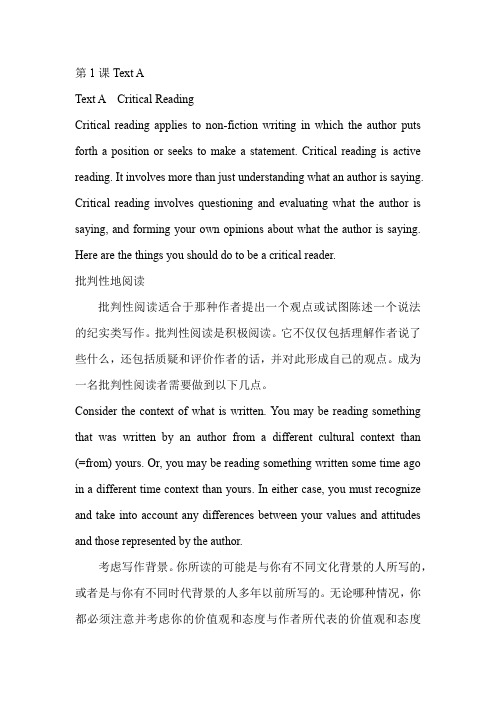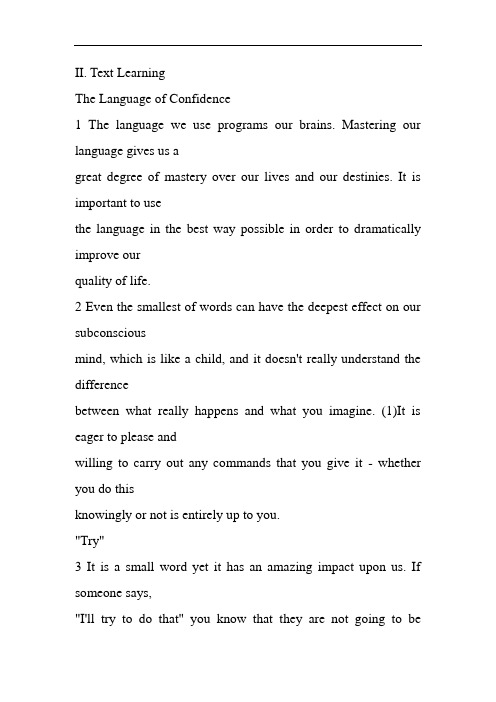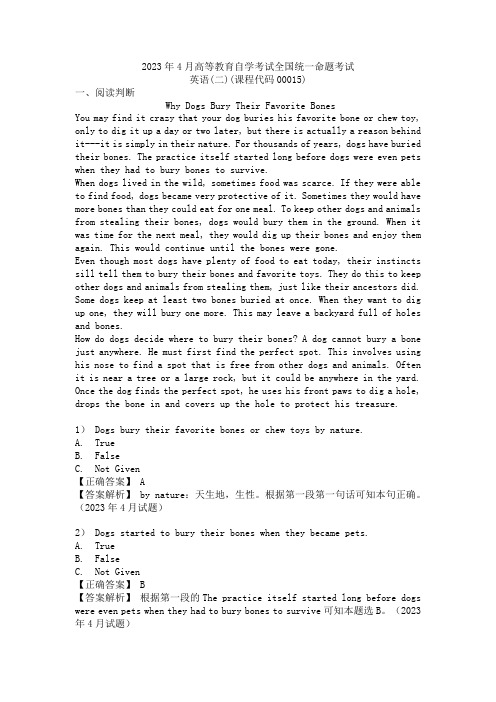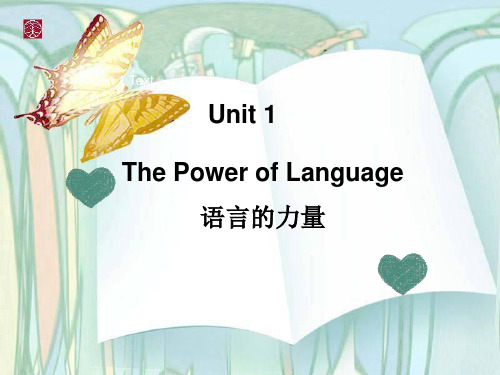00015新版英语(二)教材课文精讲及课后题目解答(Unit1)
自学考试00015英语(二)Unit 1课文

(3)In either case, you must recognize and take into account any differences between your values and attitudes and those represented by the author.
those是代词,代替前面的复数名词values and attitudes。
⑦ Identify any possible author bias. (6)A written discussion of American politics will likely look considerably different depending on whether the writer is a Democrat or a Republican.
A. of
B. in
C. at
D. with
【答案】D 【解析】本题考查consist的用法。consist of意为"由…… 组成";consist in意为"在于";consist with意为"与……一 致",故选D。consist at不存在。该句的意思是"说实话, 我真希望这次你的言行能一致"
9. represent v. 描述;表现 representative adj./n. 10. assertion n. 明确肯定;断言 11. sufficient adj. 足够的;充足的
Sufficiency insufficient
12. statistic n. statistics [pl.]统计数字;统计资料 13. integrate v.(使)合并,成为一体
00015 英语二 第一单元课后答案及参考译文

第1课Text AText A Critical ReadingCritical reading applies to non-fiction writing in which the author puts forth a position or seeks to make a statement. Critical reading is active reading. It involves more than just understanding what an author is saying. Critical reading involves questioning and evaluating what the author is saying, and forming your own opinions about what the author is saying. Here are the things you should do to be a critical reader.批判性地阅读批判性阅读适合于那种作者提出一个观点或试图陈述一个说法的纪实类写作。
批判性阅读是积极阅读。
它不仅仅包括理解作者说了些什么,还包括质疑和评价作者的话,并对此形成自己的观点。
成为一名批判性阅读者需要做到以下几点。
Consider the context of what is written. You may be reading something that was written by an author from a different cultural context than (=from) yours. Or, you may be reading something written some time ago in a different time context than yours. In either case, you must recognize and take into account any differences between your values and attitudes and those represented by the author.考虑写作背景。
00015英语二第一单元课后答案及参考译文

00015英语二第一单元课后答案及参考译文第1课Text AText A Critical ReadingCritical reading applies to non-fiction writing in which the author puts forth a position or seeks to make a statement. Critical reading is active reading. It involves more than just understanding what an author is saying. Critical reading involves questioning and evaluating what the author is saying, and forming your own opinions about what the author is saying. Here are the things you should do to be a critical reader.批判性地阅读批判性阅读适合于那种作者提出一个观点或试图陈述一个说法的纪实类写作。
批判性阅读是积极阅读。
它不仅仅包括理解作者说了些什么,还包括质疑和评价作者的话,并对此形成自己的观点。
成为一名批判性阅读者需要做到以下几点。
Consider the context of what is written. You may be reading something that was written by an author from a different cultural context than (=from) yours. Or, you may be reading something written some time ago in a different time context than yours. In either case, you must recognize and take into account any differences between your values and attitudes and those represented by the author.考虑写作背景。
自考汉语言本科:00015英语二讲义第1章(Unit 1 The Power of Language ) 0105

II. Text LearningThe Language of Confidence1 The language we use programs our brains. Mastering our language gives us agreat degree of mastery over our lives and our destinies. It is important to usethe language in the best way possible in order to dramatically improve ourquality of life.2 Even the smallest of words can have the deepest effect on our subconsciousmind, which is like a child, and it doesn't really understand the differencebetween what really happens and what you imagine. (1)It is eager to please andwilling to carry out any commands that you give it - whether you do thisknowingly or not is entirely up to you."Try"3 It is a small word yet it has an amazing impact upon us. If someone says,"I'll try to do that" you know that they are not going to beputting their wholeheart into it, and may not even do it at all. (2)How often do you use the wordtry when talking about the things that matter to you? Do you say "I'll try to bemore confident" or "I'll try to do that" or "I'll try to call"?4 Think about something that you would like to achieve, and say it to yourselfin two different ways. Firstly say, "I'll try to …" and notice how you feel.Next say, "I will do …" and see how you feel.5 (3)The latter makes you feel better than the first one, doesn't it? It givesyou a sense of determination, a feeling that it will be done. Listen to thepeople around you and when they say they will try notice if it gets done or not.Eliminate the word try from your dictionary and see how your life improves.(承上句)本部分重点及难点:显示重难点解析1. It is eager to please and willing to carry out any commandsthat you give it- whether you do this knowingly or not is entirely up to you.它渴望取悦,乐意听从你给它的任何命令,而你是有意还是无意地做这些完全取决于你。
自考英语二(00015)Unit1-TextB 课文

command v. 命令,指挥;控制 n. 指挥,控制;司令部 commander 指挥官;司令官 commandment 戒律;法令 commandant 司令官,指挥官;军事学校的校长 eg. 他命令士兵们把大门关上。 He commanded the soldiers to shut the gate. knowingly adv. 故意地;机警地,狡黠地 近义词:intentionally knowing adj. 博学的;狡猾的;心照不宣的 n. 认知 eg. 我们不知道政府有没有故意或蓄意地掩盖事实。 We did not know that whether the government knowingly or consciously choose to cover the truth.
1. a great degree of 很大程度上的 eg. All these are valid reasons for a very great degree of freedom. 所有这些都是要求高度自由的合理原因。 2. mastery n. 掌握,掌控 eg.Science offers us total mastery over environment and over our destiny. 科学给了我们对环境自身命运很大的掌控权。 He doesn’t have mastery of the basic rules of grammar. 他没有掌握语法的基本规则。
2023年4月高等教育自学考试00015英语(二)答案及解析

2023年4月高等教育自学考试全国统一命题考试英语(二)(课程代码00015)一、阅读判断Why Dogs Bury Their Favorite BonesYou may find it crazy that your dog buries his favorite bone or chew toy, only to dig it up a day or two later, but there is actually a reason behind it---it is simply in their nature. For thousands of years, dogs have buried their bones. The practice itself started long before dogs were even pets when they had to bury bones to survive.When dogs lived in the wild, sometimes food was scarce. If they were able to find food, dogs became very protective of it. Sometimes they would have more bones than they could eat for one meal. To keep other dogs and animals from stealing their bones, dogs would bury them in the ground. When it was time for the next meal, they would dig up their bones and enjoy them again. This would continue until the bones were gone.Even though most dogs have plenty of food to eat today, their instincts sill tell them to bury their bones and favorite toys. They do this to keep other dogs and animals from stealing them, just like their ancestors did. Some dogs keep at least two bones buried at once. When they want to dig up one, they will bury one more. This may leave a backyard full of holes and bones.How do dogs decide where to bury their bones? A dog cannot bury a bone just anywhere. He must first find the perfect spot. This involves using his nose to find a spot that is free from other dogs and animals. Often it is near a tree or a large rock, but it could be anywhere in the yard. Once the dog finds the perfect spot, he uses his front paws to dig a hole, drops the bone in and covers up the hole to protect his treasure.1) Dogs bury their favorite bones or chew toys by nature.A. TrueB. FalseC. Not Given【正确答案】 A【答案解析】 by nature:天生地,生性。
自考英语二(00015)unit1 text A 课文

Pre-reading Questions
1. Do you usually challenge the idea an author represents? What do you think is active reading?
通常情况下,你是否会反对作者提出的观点?你认为 什么是积极阅读?
Making Suggestions
Steve: Hi, Jenny, would you like to do something with me this weekend? Jenny: Sure. What shall we do? Steve: I don't know. Do you have any ideas? Jenny: Why don't we see a film? Steve:That sounds good to me. Which film shall we see? Jenny: Let's see Action Man 4.
史蒂夫:8点在瑞克斯影院。看电 影之前我们吃点东西怎么样?
Jenny: Sure, that sounds great. What about going to that new Italian restaurant Michetti's?
珍妮:当然了,好主意。去新开 的意大利餐馆梅开缇吧。
Steve: Great idea! Let's meet there 史蒂夫:太好了! 6点钟在那不见
史蒂夫:我不想看那部电影,我 不喜欢看充满暴力的影片。《疯 狂的布朗医生》怎么样?听说很 有趣。
quite a funny film.
Jenny: OK. Let's go see that. When 珍妮:好的。就看这部吧!几点
00015 英语二 第二单元课后答案及参考译文

00015 英语二第二单元课后答案及参考译文Title: Answers and Reference Translation for Unit 2 of English II HomeworkIntroduction:In this article, we will provide the answers and reference translation for the exercises in Unit 2 of the English II textbook. Each exercise will be discussed and explained thoroughly, ensuring a clear understanding of the material. Let's dive into the answers and reference translation for Unit 2!Exercise 1:1. The correct answer should be "b", which means "talent" in English.Exercise 2:1. The reference translation for the sentence is: "Where is the nearest supermarket?"Exercise 3:1. The correct translation for "吃饭" is "have a meal" or "eat".2. The phrase "怎么样" means "how about" or "what about" in English.Exercise 4:1. The correct answer is "b". The phrase "国王的房间" in English is "the king's room".Exercise 5:1. The reference translation for "认识" is "to know" or "to recognize" in English.Exercise 6:1. The correct translation for "他是我的朋友" is "He is my friend" in English.2. The phrase "多大" means "how old" in English.Exercise 7:1. The correct answer should be "c", which means "bathroom" in English.2. The reference translation for "看起来" is "to look like" or "to appear" in English.Exercise 8:1. The correct translation for "她在做什么" is "What is she doing?" in English.2. The phrase "在写信" means "writing a letter" in English.Exercise 9:1. The correct answer is "b". The phrase "他们的老师" in English is "their teacher".2. The reference translation for "最聪明" is "the smartest" in English.Exercise 10:1. The reference translation for "喜欢做" is "to like doing" in English.2. The correct translation for "为什么" is "Why" in English.Conclusion:In this article, we have provided the answers and reference translation for the exercises in Unit 2 of the English II textbook. By going through each exercise and explaining the correct answers, we hope to have assisted in your understanding of the material. Remember to practice these exercises further to reinforce your knowledge of the English language. Happy learning!。
- 1、下载文档前请自行甄别文档内容的完整性,平台不提供额外的编辑、内容补充、找答案等附加服务。
- 2、"仅部分预览"的文档,不可在线预览部分如存在完整性等问题,可反馈申请退款(可完整预览的文档不适用该条件!)。
- 3、如文档侵犯您的权益,请联系客服反馈,我们会尽快为您处理(人工客服工作时间:9:00-18:30)。
00015新版英语(二)教材课文精讲及课后题目解答第一单元Unit 1:the power of language (语言的力量)英语(二)共12个单元,每个单元由3部分构成:Text A, Text B以及学好英语的小技巧介绍。
另外,每4个单元学完后会有一套单元模拟测试题。
课程的具体安排如下:每个单元的AB篇文章以及其中的重要单词、短语都会做精讲,课后练习题挑选出对大家难度较大的进行讲解,最后一部分的英语学习技巧会适当介绍。
另外,有同学会问:是否需要同时学习英语(一)呢?我的答案是这样的:两套教材所配的各24篇短文,各具特点,在学习过程中就是需要培养阅读技能,与此同时要多积累单词,而且在考试中彼此没有关系,但惟独一点,即,英语二教材中没有单独安排英语语法内容的学习,而对于基础较弱的同学而言,可能需要看一看英语一的相关语法知识,以便更好地理解短文!今天学习第一单元的Text A:Critical Reading本文的中心就是:积极地阅读就是批判性阅读!6行黑体字代表文章的6个部分:1.考虑所写文章的背景;2.质疑作者提出的断言;3.关于某个题材的作品要和其它的作品进行对比;4.分析作者提出的假设;5.评估作者使用的资料的来源;6.找出作者有可能持有的任何偏见领读课文和单词。
一:本课重点词汇讲解,学习1.critical: adj 有判断力的;同根词有:critic: n 评论家;critically: adv 批评地,挑剔地2.statement: n 说法,立场;同根词有:state: v 陈述如:1). We were not surprised by their statement that the train services would be reduced.2). Clearly state your address and telephone number.3.evaluate: v 评估、评价;同根词有:evaluation: n4.assertion: n 断言;动词形式:assert5.sufficient: adj 足够的,充足的(= enough), 同根词有:sufficiency: ninsufficient: adj 不充足的。
pare: v 比较;同根词还有:comparison: n 常见搭配:compare to/with.但两个短语含义不同:compare...to为“把...比喻为,把...比成“,指不同类事物的比较,表示抽象的比喻。
compare...with为“把...与...比较”,指两个同类的事物相比较,表示人和人,事物与事物之间异同的程度。
如:1). Direct comparison between the two languages is not possible..2). Compared with many women, she was indeed very lucky.3). Life is compared to a voyage.(生命常被比作一次航行。
)7.consistent: adj 相符的,一致的;同根词还有:consistency: n 一致性inconsistent: adj 不一致的;inconsistency: n如: These results are consistent with the findings of the previous study.8.valid: adj 符合逻辑的,有效的;反义词:invalid.如: I’m afraid your driving license is invalid in Eastern Europe.9.credible: adj 可靠的,可信的;同根词还有:credibility: n 可靠性;incredible:不可思议的;惊人的;如: 1). Some planets run at incredible speed.2). The police have lost their credibility.10.relevant: adj 密切相关的;反义词:irrelevant,常用固定搭配:be relevant to sth/sb: 同。
密切相关如:These comments are not directly relevant to this inquiry.这些意见与这项调查没有直接联系。
11.appropriate:adj (= suitable)合适的,恰当的;反义词:inappropriate12.bias: n 偏见,偏心;biased: adj 有偏见的;be biased towards...13.considerably: adv 相当多地,形容词:considerable.如:Twenty-five dollars was considerably more than he had expected to pay.14.reflect: v 显示,表达;同根词:reflection: n如:The statistics reflects a change in people’s spending habit.二.课文重点句子分析、讲解:1. Critical reading applies to non-fiction writing in which the author puts forth a position or seeks to make a statement. (Paragraph 1 line 1)译文:批判性阅读适用于纪实文学作品,在这种作品中作者提出一个立场或者试图发表一项声明。
语言点:in which...是一个定语从句,修饰non-fiction writing。
本句话中有许多的固定搭配:1)apply to: 适用,应用;如: These principles apply to learning maths.2)put forth (= put forward): 提出,产生;如:The scientist put forth the new theory of evolution.3)seek to do: 试图、尽力做某事;如:We seek to save a planet, a world of life。
4)make a statement:做出一个陈述,发表一个声明。
如:He refused to make a final statement.2. You may be reading something that was written by an author from a different cultural context than yours.(P2L1)译文:你有可能正在阅读一部作品,而这部作品的作者来自于一个跟你完全不同的文化环境。
语言点:may be reading情态动词表示推测语气,有可能正在。
;后面 that引导的是一个定语从句,修饰something;cultural context:文化环境,文化背景。
3. Or you may be reading something written some time ago in a different time context than yours.(P2L2)译文:或者你有可能正在阅读一部不久前写出的作品,而它的时代环境与你的完全不同。
语言点:此句的结构跟上一句大体相同,最大的不同就是把一个定语从句转换成了过去分词短语作定语:written some time ago = that was written some time ago.4. In either case, you must recognize and take into account any differences between your values and attitudes and those represented by the author. (P2L3)译文:无论是两种中的哪一种情形(针对上面2,3句),你都必须要承认并考虑在你的价值观,态度和被作者所提出异议的那些东西之间的差异。
语言点:这个句子理解上难度有点大。
Either:两者中任何一个;case:事件,情况,案例;value:价值观;attitude:态度;represent:提出异议,代表。
represented by the author:过去分词短语作定语,修饰 those(values and attitudes)重点短语:1)take into account = take into consideration 考虑。
如: I believe you will take my advice into account.2)differences between...and... (两者之间的差异,不同)5. Don’t accept what is written at face value.(P3L1)译文:不要没有丝毫质疑的就接受所写作品。
语言点:accept/take sth at face value: 相信表面,毫不质疑。
6. Before accepting what is written, be certain that the author provides sufficient support for any assertions made.(P3L2)译文:在接受作品之前,要确定作者对于做出的任何断言都提供了足够的支持。
语言点:accepting放在介词Before后面,是动名词用法; that 引导的是宾语从句。
重点短语:provide...for... 为。
提供。
; make assertion: 做出断言。
7. Look to see that what is written is consistent with what others have written about the subject. (P4L1)译文:看看这个作品同其他人所写的关于这个主题的作品是否一致。
语言点:重点短语:be consistent with:同。
一致;What you have said should be consistent with what you have done.8. Assumptions are whatever the author must believe is true in order to make assertions.(P5L1)译文:假设就是为了做出断言作者必须相信会是正确的东西。
